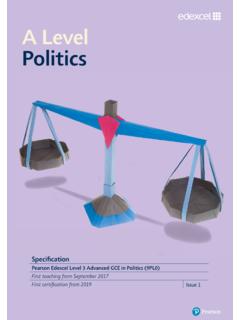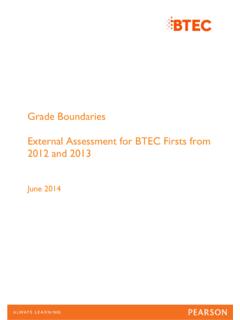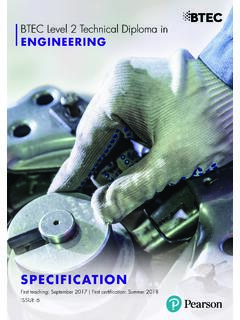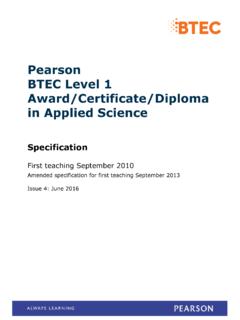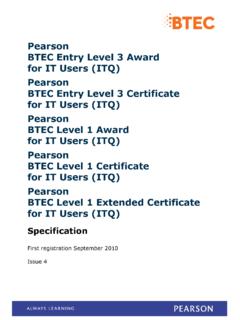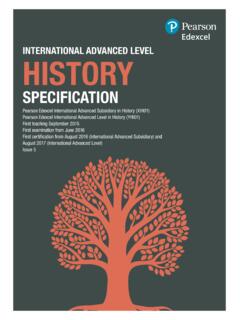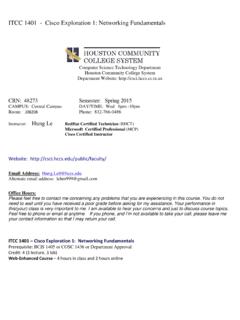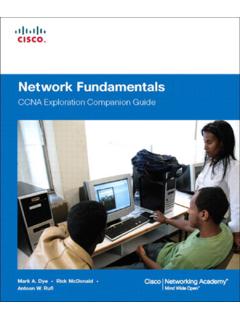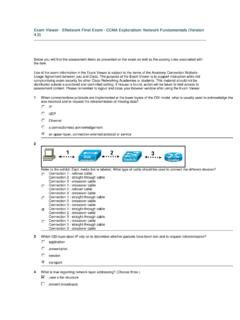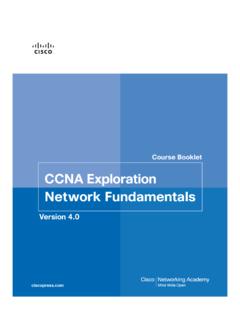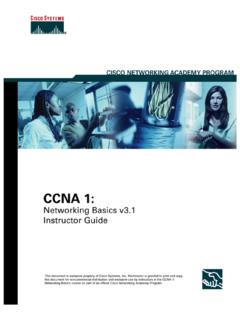Transcription of Unit 105: CCNA Fundamentals of Networking …
1 Edexcel BTEC Level 3 Nationals specification in Information Technology Issue 1 September 2010 Edexcel Limited 20101 Unit 105: ccna Fundamentals of Networking ( exploration 1)Unit code: A/601/7537 QCF Level 3: BTEC in ITCredit value: 10 Guided learning hours: 80 Aim and purposeThis unit introduces the architecture, structure, functions, components, and models of the internet and other computer networks. It uses the OSI and TCP layered models to examine the nature and roles of protocols and services at the application, network , data link, and physical layers. The principles and structure of IP addressing and the Fundamentals of Ethernet concepts, media, and operations are introductionThis unit is a comprehensive introduction to the basics of computer Networking and telecommunications principles.
2 This is the first of four units in the exploration study pathway, leading to the Cisco Certified network Associate ( ccna ) qualification. This unit focuses on network terminology and protocols, Local Area Networks (LANs), Wide Area Networks (WANs), conceptual models, cabling, cabling tools, routers and introductory router unit covers Networking sector skills and knowledge that an ICT network technician would need to successfully complete their work. In particular, learners will be taught how to attach a computer to a network system, connect copper cabling, devise a subnet scheme, plan and recommend improvements to a network infrastructure.
3 In addition, learners will be able to troubleshoot simple Networking hardware communication problems. Learners will understand and apply commonly used Networking technologies in a variety of contexts and appreciate what takes place in the daily operation of a unit involves hands-on, lab-oriented activities that stress laboratory safety and working effectively in a group environment. Theory aspects are studied and tested online using Cisco s own electronic curriculum which learners may also access from home. The unit is delivered through a blended learning approach where tutor-led teaching is combined with the electronic materials and unit is assessed via the Cisco network Fundamentals (CCNA1) online examination.
4 There are further criteria for merit and distinction BTEC Level 3 Nationals specification in Information Technology Issue 1 September 2010 Edexcel Limited 20102 Learning outcomesOn completion of this unit a learner should:1 Know the diverse types of network systems and devices in common use2 Know how different network technologies operate and communicate3 Understand OSI and TCP/IP and their relationship to the operation of network systems4 Be able to configure a workstation for connection to a network5 Be able to design a sub- network scheme6 Be able to recommend improvements to an existing network BTEC Level 3 Nationals specification in Information Technology Issue 1 September 2010 Edexcel Limited 2010 Unit content in relation to the Merit and Distinction CriteriaNetwork infrastructure.
5 Eg small (less than 250 devices), medium (less than 65530 devices), large (over 65540 devices)Devices: eg mobile devices, workstations, printers, routers, switches, wireless access points network design: logical topology, eg star, bus, ring, hierarchical, mesh; physicaltopology eg cabling infrastructure, wireless, fibre, 3G, 4 GSub- Networking : eg class A, Class B, Class C, private addresses, public addressesMultiple hosts: more than two workstations or mobile devicesOSI model: International Standards Organisation seven layer Open Systems Interconnection modelTCP/IP model: DARPA (USA Defense Advanced Research Projects Agency) four layer transmission control protocol/internet protocol Long-term: five or more yearsNetwork.
6 Eg small business system, academic system, public system, case study scenario, switched infrastructure, routed infrastructure Test: eg top down, bottom up, systematicTroubleshoot: eg show commands, cable tester, protocol analysis, system logs, debug output, use of toolsPlan: eg using packet tracer, viso, diagrams, command selection, cable selection, protocol designEdexcel BTEC Level 3 Nationals specification in Information Technology Issue 1 September 2010 Edexcel Limited 20104 Assessment and grading criteriaIn order to pass this unit, the evidence that the learner presents for assessment needs to demonstrate that they can meet all the learning outcomes for the unit.
7 The assessment criteria for a pass grade describe the level of achievement required to pass this unit. Assessment and grading criteriaTo achieve a pass grade the evidence must show that the learner is able to:To achieve a merit grade the evidence must show that, in addition to the pass criteria, the learner is able to:To achieve a distinction grade the evidence must show that, in addition to the pass and merit criteria, the learner is able to:Pass Cisco network Fundamentals (CCNA1) examination. The centre will evidence this with a copy of the learner s class grade book from the assessment system on completion of the unit (this must be listed by learner name).
8 A pass grade is a score of 70% or more in the final review an existing network infrastructure and provide recommendations for improvement[IE]D1 justify a network design which will allow for long-term growth [IE, CT, SM]M2 recommend a sub- Networking scheme for a small-scale network infrastructure, using private addressing[IE]D2 justify a private sub- Networking scheme, which could be used on medium or large-scale systems, identifying individual sub-networks[CT, RL]M3 plan and implement a network system with multiple hosts to access the internet (or another network ).[IE, TW, EP, SM]D3 compare the OSI and TCP/IP Networking models.
9 [IE]PLTS: This summary references where applicable in the pass criteria, in the square brackets, the elements of the personal, learning and thinking skills. It identifies opportunities for learners to demonstrate effective application of the referenced elements of the independent enquirersCT creative thinkersRL reflective learners TW team workersSM self-managersEP effective participators5 Edexcel BTEC Level 3 Nationals specification in Information Technology Issue 1 September 2010 Edexcel Limited 2010 Essential guidance for tutorsDeliveryCisco network Fundamentals CCNA1 is a proprietary unit within the Cisco Networking Academy program.
10 The curriculum, assessment and support materials are available only to institutions participating in the program. Cisco Systems makes these available at no cost for any non-profit institution; there are some costs for instructor training and support. For detailed information please consult this web learners are following the Cisco unit in parallel with a BTEC National unit then it is recommended that the two aspects of the assessment are integrated. Tasks being completed as part of the practical preparation for Cisco Skills Based Exams can then be used to support the BTEC assessment for the merit and distinction view general information about the Cisco network Fundamentals (CCNA1) objectives please visit: The detailed scope and sequence documents are available to academies on the Cisco internal learning planCisco Systems as part of the their academy programme, provide learning plans and study guidance for their units.
